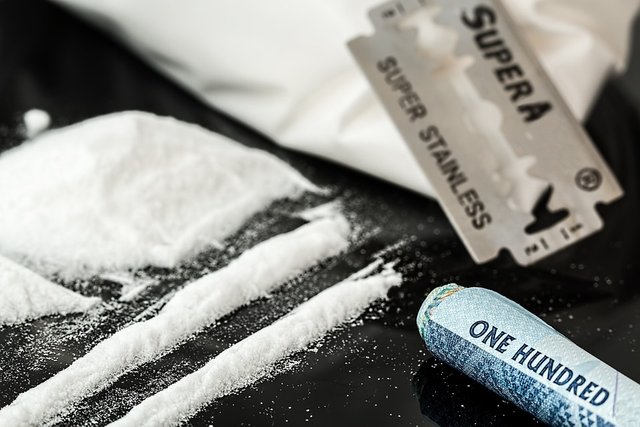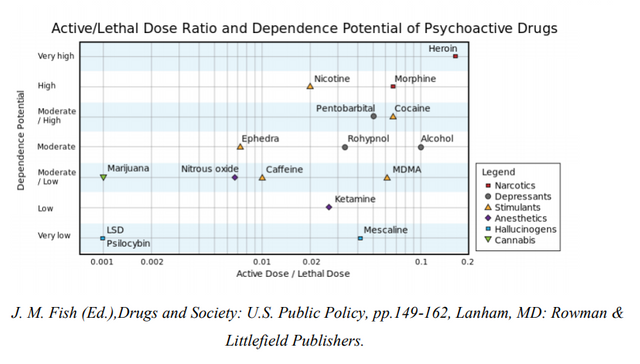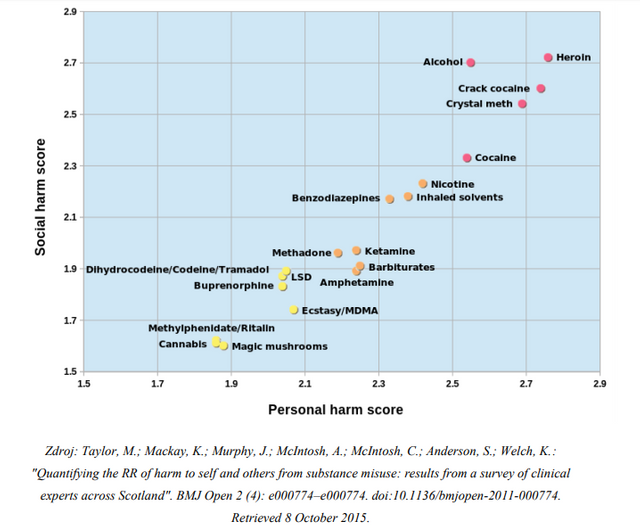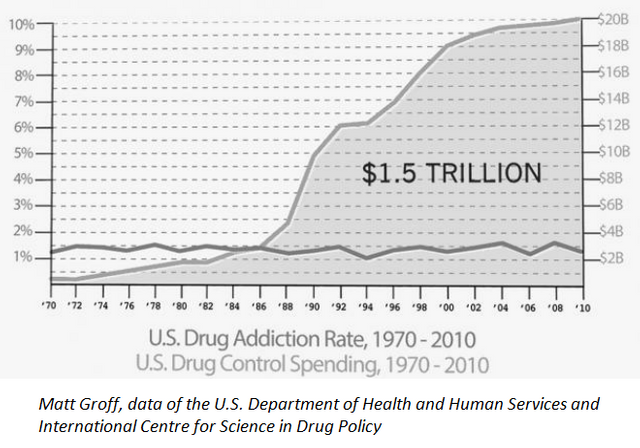8 Reasons to Legalize All Drugs

Recently, an annual marijuana legalization festival was held in Prague. The effort to enforce marijuana legalization is something that I fully support – and it seems that over time this goal could finally be achieved as society is more and more tolerant to marijuana. My (rather controversial) view, however, is that we could go even further. In this article, I would like to briefly explain to you why I stand for legalizing all drugs – starting with already legal nicotine, ending with heroin. And although this topic sounds crazy for most people, it makes sense to me from a point of view of a future doctor, as well as from an economic, moral and humane point of view. So before you condemn my opinions after these lines, please read on.
1) Medicaments are drugs and drugs are medicaments
Medicaments are drugs and drugs are medicaments – they only differ in words, but the principle is the same. Medicaments and drugs are, by definition, any substances that are implanted into the organism and can change one or more of its functions. The only difference is that some of these physiologically active substances are illegal to use.
From history, we can read that heroin was originally used as a cure for pain and cough. Cocaine was commonly used as a local anesthetic. Nowadays, it would be obsolete to use these substances we call drugs in these areas because we have more effective and safer medicines. In other areas of medicine, however, some psychoactive substances appear to be able to return to therapy. In the Czech Republic, psychiatric research with LSD took place in the 1970s – a substance that can have a great potential in this area. However, research was interrupted by the LSD prohibition, although LSD is a very safe drug in many aspects – it does not create any potential for dependence, it is not toxic; you cannot overdose on it (even a really big dose of LSD will not kill you); when taking more and more doses in a short interval, its psychoactive efficiency is getting smaller (which motivates the user to make a break between doses). Today, the attitudes towards psychoactive substances in the world are improving again, and even in the psychedelics we speak of the “renaissance”. In the advanced phase of drug testing in the US is the MDMA (so-called ecstasy) – and it seems that with psychotherapy and appropriate setting it is very effective for post-traumatic stress disorder where other drugs fail. In the Czech National Institute for Mental Health, experiments with hallucinogenic psilocybin are being conducted and it could help patients with depressions in the future.
MDMA, psilocybin and LSD are substances with a tremendous potential for science and therapy of psychiatric patients. But their problem is the stigma of being illegal. However, benzodiazepines (other addictive psychoactive substances) are used by thousands of people for a good sleep or tranquillizing and the tablets of Neurol, Xanax, Dormica and similar products are considered to be absolutely automatic.
2) It does not make any sense when alcohol is legal and LSD is not
Although there are many charts that compare drugs to each other and show that alcohol, caffeine and nicotine are, in some ways, very serious drugs, they are socially tolerated drugs which are not very regulated by the state.
Division into “light” and “heavy” drugs I consider to be unfortunate because every substance can be light or heavy in completely different ways. It is therefore possible to use more metrics for the comparison of psychoactive substances and their hazards – the potential for dependence, harm to the user, harm to the user’s environment and the ratio of the effective/lethal dose.
The first chart I present compares the potential of drug dependence (on the vertical axis; so the more the substance is higher, the greater the potential for dependence it has) and the ratio of effective/lethal dose (on the horizontal axis; the more the substance is on the left, the more difficult – in case of LSD it is impossible - it is to overdose and die because of the substance). It is worth mentioning that even caffeine is worse in both aspects than LSD and psilocybin; MDMA (ecstasy) and ketamine are better than alcohol. It is also important to say that the potential of dependence is a difficult to measure, and I think it is also highly individual. It may happen, therefore, that someone never becomes physically dependent on nicotine but, on the contrary, after trying meth one has to take another dose.

The second graph on the horizontal axis compares the harmfulness of drugs to the user’s body. Here again, marijuana, ecstasy and LSD are better than alcohol, besides which we have the benzodiazepines, which are used by thousands of people in the Czech Republic today for anxiety and sleep. On a vertical axis, we compare harmfulness to the user’s surroundings – here is alcohol on the same level as heroin (although in case of heroin, it is so high probably just because of the crime associated with high price per dose). With alcohol we are used to situations when some people – after few glasses – fight each other; in this respect, alcohol is clearly one of the worst drugs.

It is important to note that both in the case of alcohol and in the case of other drugs it is a lot about the dose – the consumed amount. One beer can be used for a good sleep, and micro-doses of LSD are being tested by users around the world to increase concentration and work performance. Different effects of both drugs can be expected if they are consumed in large quantities.
3) Drug prohibition costs money and does not work
Drug prohibition and “war on drugs” have a significant impact on public finances everywhere in the world. It is primarily the cost of tackling crime, as drug trafficking is perceived as a criminal activity. To analyze the efficiency of the war on drugs, the United States are the best, because they have clear data over the last forty years that is not affected by changes in the political system as it is in Europe. The US drug policy has not changed significantly over the years.

This chart monitors the situation in the US by summarizing data from the Department of Health and Human Services and International Centre for Science in Drug Policy. It shows the development of the amount of drug addicts and the cost of the war on drugs. From this graph we can conclude that the increasing cost of drug prohibition does not affect the number of addicted people.
The analysis of the impact of alcohol prohibition in the years 1920 to 1933 can also be very helpful to understand the problematics, where it was possible to observe the direct effects of the abrupt prohibition and then the consequences of legalization after the end of prohibition. With total alcohol prohibition, not only did consumption not decrease overall, but it was even higher than in the year of 1918. [1]
A similar parallel may be the marijuana market in the Czech Republic, because although it is illegal to trade with marijuana, it is very easy to get it, it is socially tolerated and the Czech Republic is among the countries with the largest consumption of marijuana among young adults. [2]
4) The black market creates substances that can be dangerous even for responsible users. And for those irresponsible they are more destructive.
It makes sense – in a market that is not legal, you have a very limited amount of places where to get the drug because the costs on the drug market are huge (not only financial costs, but also the potential risk of being caught). Responsible people wait for a certified supplier, listen to the reference to the quality of the substance, and after receiving it they often test the chemical composition [3]. Less responsible individuals will be satisfied with a faster delivery and often even with a low price. In these cases, life may be in danger, as the drug can be supplemented with an unknown and harmful substance. It is also possible that the customer gets another drug – the user may not be ready for this and the resulting experience can be scary and very negative. As Mark Thornton says in his work on the consequences of the greatest alcohol prohibition:
“The death rate from poisoned liquor was appallingly high throughout the country. In 1925 the national toll was 4,154 as compared to 1,064 in 1920.” [1]
Murray N. Rothbard:
“Paradoxically, the prohibition may serve as a form of grant of monopolistic privilege to the black marketers, since they are likely to be very different entrepreneurs from those who would succeed in a legal market. For in the black market, rewards accrue to skill in bypassing the law or in bribing government officials.” [4]
Dark markets, secret online stores, are an interesting case (and an example of a free market in the field of drugs). Drug dealers have a profile here and compete with each other. Anyone who offers a bad drug will therefore get a bad reference and will lose customers. Dark markets are actually a competitive market, although for running a dark market you may go very quickly and for a long time to prison (just because you allowed people to trade with each other). [5]
5) The society is not educated in the matter of drugs and is deliberately manipulated
We want our close people, our own children and even the whole society to behave responsibly; we want them to see the consequences of their actions. Not otherwise it is with respect to drugs. However, education on illegal substances is poor. Manipulatively, the children in elementary schools are being taught many lies when adults are trying to scare them – and sometimes even not intentionally, because they themselves heard a lot of delusions about drugs. Children learn that marijuana is a gateway drug and who once tries a heavy drug, gets to the edge of the society. This is in full contrast with the fact that drinking alcohol (that is a heavy drug) is not so bad according to society, and some families have the habit of giving the child a glass of beer for a Sunday dinner. And while both adults and children have a fairly good understanding of when drinking alcohol is a problem, in case of drugs it is a big unknown. Some adolescent teenagers try marijuana. They find out that it is nothing terrible, even though it is illegal, and many people have been scaring them. Then... how should they have a respect for other illegal drugs when with marijuana, nothing dramatic happened?
Nescience is a big risk in case of drugs, because when you are properly educated, many illegal drugs should not be significantly more dangerous than legal medicaments. I can mention for example MDMA. Did you know that its too frequent using may result in neurotoxicity? And did you know that when intoxicated by MDMA you should take care of a good drinking regime (ideally with minerals), and for optimal safety you can find food supplements directly designed for planned intoxication? Unfortunately, this information is know just by a very small percentage of those who take this drug somewhere on the party. And the consequences may be unfortunate.
By banning drugs, drugs never disappeared and they never will. They are used among young people more than it may seem. And I am certainly a supporter of openly discussing the risks and benefits of drugs, so people would be informed. But that is not happening today – often because of the assumption that it is nonsense to inform about the risks when using it is forbidden.
6) The illegal environment supports the black market and criminality
Prohibition pushes entrepreneurs who do not want to risk litigation with the law out of the market. So on the market remain those who ignore illegality in the sake of profits. So it is not unusual that there are various mafia structures in the field and people who are more prone to criminality.
It works as well among users. Being long-term cocaine addicted does not have to be as destructive for the user, as it is for the user’s environment because of high price of cocaine. The black market and the high cost for confidentiality in this market produce drugs much more expensive than they could be in a free market. And that makes addicted starting with criminal activities and thefts much faster.
7) Drug stigma creates more socially excluded people
Dependence (on anything) is a negative phenomenon that needs to be cured with the help of experts. And while we tolerate (or maybe even belittle) many addictions (workoholism, addiction on social networking, etc.), drug addiction is considered to be the absolute bottom of all negative social phenomena. Whoever ends up being dependent on meth today, we have the idea that he is a person that will probably be totally unusable throughout his whole life, and there are even those who say that these people should be in jail. Exclusion from society is often for dependent persons another element that is psychically destroying them. And social ostracization is sometimes one of the reasons why one becomes addicted to some heavy drug. Dependent people need help as other mentally ill. We are not helping them by segregating them. The addicted need to know that they are not useless, that we care for them. They need to know that they did it wrong, but also that they are not alone in the society and that they are able to have a word with a specialist – as in the case with other addictions, such as tobacco.
8) No prohibition has ever even reduced using of drugs
This is probably the most important argument for me. No drug disappeared and will never disappear because of drug prohibition. Even their usage has never been reduced because of prohibition. The only consequence is that the costs and the negative effects will only rise. Actually, it can be said that all the war on drugs led by police forces is useless. For me, therefore, the solution is not their banning, but rather the greatest elimination of all the negative impacts that are associated with the use of drugs today. And in my opinion, most of these impacts will be alleviated (or they will totally disappear) by legalization.
Finally, I would like to say a few more words about the practical feasibility of this controversial proposal and to add a moral background. I know that legalizing all drugs would be international suicide today, and it is not even possible because of United Nations rules (even though many high-ranking politicians, including former Secretary-General, admitted that war on drugs simply does not work [6]).
It is very probable that people from our country would start to secretly export drugs to all corners of the world and other countries could defend themselves by inspections and sanctions. I also know that in the current conditions, legalization would go wrong like a medical cannabis idea: the state would eventually make huge and unpredictable damages because it would want to put at least a large excise duty, or maybe even to control the entire sector. Therefore we are not in a state where I would propose absolute legalization to enforce today. I just think it is important to speak legitimately about this option, and to seriously discuss the negatives of the drug prohibition.
Lastly, I would add that I am a supporter of absolute personal freedom. So I advocate the right for everyone to decide what one wants to do with one’s own body, but the others have no duty to pay any negative consequences.
References:
1)Thornton, Mark: Alcohol Prohibition was a Failure, Cato Policy Analysis No. 157, 7/1991
2)European Monitoring Center for Drugs and Drug Addiction, Statistical Bulletin 2016. Prevalence of drug use - cannabis - lifetime prevalence - young adults (15-34). https://www.emcdda.europa.eu/data/stats2016#displayTable:GPS-2
3)Example of test kit for casual drug users: http://testkitplus.com/
4)Rothbard, Murray N.: Ekonomie státních zásahu, Liberální institut, Praha, 2001, p. 116.
5)The case of Ross Ulbricht, who was the owner of the dark market Silk Road: https://cs.wikipedia.org/wiki/Ross_Ulbricht
6)The Global Commission on Drug Policy: http://www.globalcommissionondrugs.org/reports/the-war-on-drugs/
Česky: https://www.mises.cz/clanky/osm-duvodu-proc-legalizovat-vsechny-drogy-2226.aspx
Author: Tereza Urzová

Even if it were to be made legal that still means you are getting politicians permission to have freedom. Decriminalizing it would make more sense from an ethical, liberty based perspective. Second, Agonists would say let the black market suffocate the state. I am all for that too. If you need governments permission to do something than your not free. Disobey.
Posted using Partiko iOS
Wow. Crazy data I didn't know
Posted using Partiko Android
there is just one legit reason needed. If i am a free human being, i am allowed to put everything in the body i own. If there is some imaginary or real authority that tries to prevent me from doing what i would like, i am a slave.
I agree. You can refuse the whole state because of moral reasons. But I do not think it is very effective to spread libertarian ideas through morals. Most people defend the state because it is simply dogma that the state is good. If you tell someone that what state does is, in principle, the same what mafia does... Well, the discussion basically ended (at least on the rational level). So that is why here on @laissez-faire we are trying to explain these topics from an economical and practical (at least in some cases :D) point of view.
I understand your message and goals, but i hold the opinion that people are easier to convice through emotional arguments. This is what got us in this mess, keep up the good work, peace love and anarchy
Posted using Partiko Android
I absolutely agree with you. Alcohol is much worse than the majority of drugs.
This was a brilliant piece! So very true. But until We remove the psychopaths from control on Our planet, Our freedom will be stifled.
What always baffles me is how we ban vegetables (mushrooms) and naturally producing brain chemicals (DMT); yet, when we prescribe highly addictive stimulants and opioids to kids, no one bats an eyelash. So inconsistent. This absurd "War On Drugs" has been a total sham and drain on taxpayer wallets.
The main damage is indeed caused by tar (I hope this word is translated correctly), as it harms mostly your lungs. From what I have heard from my surroundings, I would also think that nicotine itself is pretty much harmless, but it is probably just in the shadow of the harmful smoke.
I have respect for drugs. I would say I consume a lot of caffeine (technically, it is also a drug), but on the other hand, I do not have a big problem with avoiding caffeine. I do not have any experiences with forbidden drugs. Occasionally, I drink a few glasses of alcohol - just the amount the society demands :D. But that is all.
Great, i like it...
I agree 100% but know matter how many people I tell and the fact that countries that have legalized have gone down by 98% of abuse and overdose's but no body will listen. And if they do agree they just say what can we do. I think we should all stand up and speak out😊
I agree. I would only add that drugs are not the only thing that should be de-regulated. :)
You are right! Look at Portugal, they did it a while ago and there are practically no drug related crimes in the country.
I've used marijuana for half of my life and that is the number one reason I'm still sane in this alcohol and tobacco filled world.
I've tried shrooms, lsd and extasy. All of them gave me an experience where I grew as a person.
Marijuana is a gateway drug. Gateway to awesomeness!
Yeah, I heard about Portugal in the matter of drugs. They had also a problem with a really high rate of deaths connected with drugs. Right after making the legislation less restrictive, the death rate fell down significantly.
Drugs can give you various types of experiences. I am not a big fan of them, but I totally agree that prohibition is not a solution. It is just creating more and bigger problems. If you try to do drugs responsibly (and taking, for example, the drug crocodile is not really responsible), it is much safer than drinking alcohol. I think that taking marijuana (just as being addicted on almost everything) for half of your life was kinda mental disease, but I am glad you see it positively and that it actually gave you experience.
You're right but nah, man, I'm still using it. It's a part of my life like someone has coffee in the morning.
Peace, Love, Gratitude!
According to libertarians (many statist will - unfortunately - prohibit such behavior), it is your right to do anything with your body. But in my opinion, taking any drugs or being dependent on anything is a weakness. Just as you should have the right to damage your body, I should have the right to refuse interactions (on my land where there are my rules) with such people or to disadvantage you through services provided by me. If we were in a anarcho-capitalistic world and if I provide people a health insurance, addicted people would definitely have to pay more, as you are in a more risky group. But because of just smoking weed you would probably pay much less than an alcoholic.
Although I am against any prohibition, I am also against drugs and I do not want any of my closest to become dependent on any substance. I wish you the best, and that includes stop being addicted.
Thing is - you cannot possibly have a physical addiction to marijuana like it is to tobacco, alcohol and other things.
In our bodies we have endocannabinoid system which need cannabis to function properly.
It's not a drug. It's a medicine.
In the article, the chart from a study is shared. You can see there, that marihuana is on the same level as coffeine. So there is a potential to dependence, although it is definitely not so high as in the case of nicotine or alcohol. I think that after years of using it, you should be at least somehow addicted. But I do not know. Maybe if you do not use it so often, you could be OK. Also... the potential to dependence is individual and some people could be "resistant" to these "light drugs". And also the article says that medicine and drug are the same thing.
Here's about that built-in system I was talking about.
The most important physiologic system involved in establishing and maintaining human health.
Have an amazing day!
Ok, thank you. I'll take a look at that. ;)
I appreciate that you spent time with me discussing this problematics.
You got a 19.46% upvote from @brupvoter courtesy of @samotonakatoshi!
You got a 52.97% upvote from @oceanwhale courtesy of @samotonakatoshi! Earn 100% earning payout by delegating SP to @oceanwhale. Visit www.OceanWhaleBot.com for details!
You got a 4.49% upvote from @emperorofnaps courtesy of @samotonakatoshi!
Want to promote your posts too? Send 0.05+ SBD or STEEM to @emperorofnaps to receive a share of a full upvote every 2.4 hours...Then go relax and take a nap!
You got a 11.33% upvote from @emperorofnaps courtesy of @samotonakatoshi!
Want to promote your posts too? Send 0.05+ SBD or STEEM to @emperorofnaps to receive a share of a full upvote every 2.4 hours...Then go relax and take a nap!